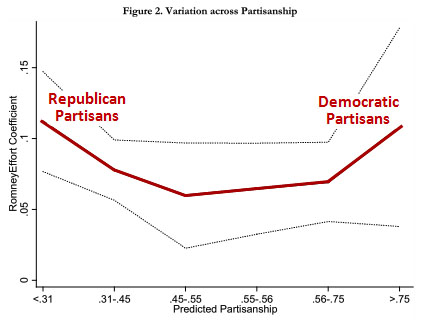
Ryan Enos and Anthony Fowler have a new paper out that tries to figure out if the Obama campaign’s widely reported techno-wizardry in the 2012 election really produced a big get-out-the-vote advantage over Mitt Romney. Apparently not:
The Obama campaign of 2012 has been championed as the most technologically-sophisticated, evidence-based campaign in history while the Romney campaign was more traditional. Does this difference manifest itself in the data? Did the technological sophistication of the Obama campaign lead their GOTV efforts to be significantly more effective than Romney’s?
…. [Our] analysis, while admittedly crude, allows us to roughly compare the effectiveness of the Obama and Romney campaigns in mobilizing their respective supporters. Despite the technological sophistication of the Obama campaign and its devotion to a data-driven, evidence-based campaign, we see
similar mobilization effects on both sides of Figure 2. It appears that the two campaigns were roughly comparable in their ability to turn out supporters.
Logic and conventional wisdom suggest that you should concentrate your GOTV effort on strong partisans, since these are the people most likely to vote for you. These are the voters Enos and Fowler analyze, and they conclude that both campaigns mobilized strong partisans about as well. Strongly organized precincts showed a 7 percent improvement in turnout on both sides.
Now, it could well be that the Obama campaign spent more money on GOTV and was thus able to influence more voters. It’s also possible that Obama was able to perform sophisticated targeting that went beyond just the most rabid partisans. So take this with a grain of salt. But if Enos and Fowler are right, the poli-sci-driven rocket science of the Obama campaign didn’t actually make much difference. The core GOTV efforts of both campaigns were about equally effective.















